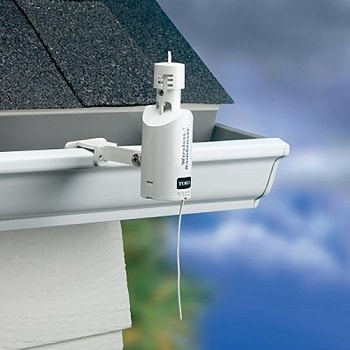What's A Rain Sensor

We see a puzzling and familiar sight in our travels across the subdivisions and commercial properties that we work on across Central Florida in the summer, sprinklers on during a rainstorm. This double watering costs money, and the cause is usually a malfunctioning rain sensor. This blog will go over the basics of a piece of equipment that you may not even know that you have.
Rain sensors aren't only necessary; they are the law. Florida has a rain sensor statute that requires all automatic landscape irrigation systems have a technology that inhibits operation during a period of significant moisture. The water-saving law has been on the books since the year 2000.
The most common sensor is the expanding disk; you may have one installed near your roof. It looks like a thick magic marker. When the disks inside the device absorb too much rainwater, it shuts the irrigation system off. When the disks dry, the system goes back online.
Dollars and sensors
Consider your rain sensor as an investment; we install them for between $150 for a wired sensor and $250 for a wireless unit. Not having one adds to your water bill every month, especially during our rainy season. For example, one of our clients' irrigation systems uses just over 13,500 gallons of water for a half-acre of turf every cycle. The average cost of water is two dollars for every thousand gallons, which means it costs just over twenty-seven dollars every cycle.
Your water bill won't be the only place where you'll see the impact of a reliable rain sensor. Fewer watering events mean less work for your irrigation system, which has a lot of parts, some of them delicate. Too much water makes your lawn and landscape vulnerable to pests and diseases, like yellow patch fungus. A sign that your grass is getting too much water is weeds, lots and lots of them. Saving water is also good for the environment. Besides conservation, smart watering protects the runoff of fertilizer and pesticides from getting into storm drains and the groundwater.
There's a lot about rain sensors, like the best place to install one and the differences between wireless and wired ones. Our irrigation technicians are rain sensor savants and would love to hang one or a few on your property. Contact us, and let's make sure your yard gets the amount of water that it needs.
